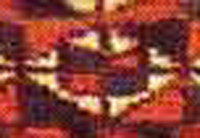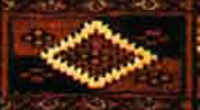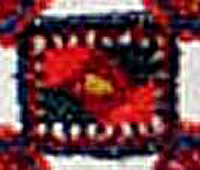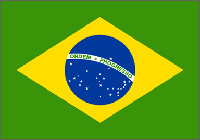Since there was a little exchange in another thread about whether the "out of context" device in my tentband is an aina gul, I thought it might be interesting and maybe even instructive to explore this further.
Here are (blurry, but discernable) images of the two major subtypes of what is called the aina (the word means "mirror", in case anyone cares), gul:


What they have in common is a diamond enclosed in a rectangle, but the difference in the interiors is evident even in these fuzzy images.
Here's the device that shows up in my tentband.

It is, obviously, a diamond enclosed within a rectangle. Equally obviously, if a weaver tried to make an aina gul on the very small scale of the device on the tentband, she'd have to simplify it down to something like this. That, of course, doesn't prove that the device is a simplified aina gul, only that it could be. I suspect that it is, but that doesn't constitute proof, either.
So the question arises, "How much variation can there be before something is no longer an aina gul?" It doesn't sound very complicated at first, but watch what happens when we try to make it more specific.
If the definition of an aina gul is a western concept, independent of the Turkmen concept of one (which, presumably, goes back a few hundred years at least and has some cultural meaning), then we can use any definition we like. A diamond within a rectangle, if we decide on it, is all we have to say.
But if we want to use the Turkmen concept, we have to admit that we don't know what that is. That is, would a mid-19th century (for instance) Turkmen think that both the Turkmen guls that we generally call aina guls are the same thing in terms of their essential properties (sort of like letters done in different fonts)? Who knows? Maybe the answer is yes, maybe not.
And, just to bring the matter to a point of absurdity, take a look at this diamond enclosed within a rectangle.


Regards,
Steve Price